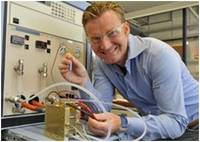UniCat scientist searching for novel electrochemical energy storage devices for electric vehicles
Two novel chemical energy storage technologies for electric vehicles are the focus of research at the TU grpup of Technical Electrochemistry. Under the direction of UniCat Professor Peter Strasser
scientists are working on the magnesium ion battery and on alcohol fuel cells to extend the range of the batteries. „Both storage technologies could outclass the chemical storage technologies commonly used today in important items“, explains Peter Strasser.
Together with colleagues from the TU München, the Tsinghua University in Beijing and the Tongji University in Shanghai, they want to develop new catalyst materials, which increase several times the power density of the alcohol fuel cell and thus minimize the size of the alcohol tanks.
Hydrogen-powered fuel cells are already used in electric vehicles for energy storage and conversion. Fuel cells are electrochemical energy systems converting directly chemically stored energy of a chemical fuel, such as hydrogen, into electricity and power the electric vehicle using an electric motor. Today's standard storage of high energy hydrogen gas in high pressure tanks, that can also be installed under the driver's seat, and the filling of these tanks require very strict safety precautions and often still haven’t won wide public support.
Liquid alcohol, however, could be stored and refueled just like gasoline. In conjunction with an alcohol fuel cell, electricity for the vehicle can be obtained directly from an aqueous alcohol mixture. The great advantage is that the alcohol can be used directly as an aqueous mixture from bioengineering plants and doesn’t have to be purified from traces of humidity. Thereby considerable energy and expenses can be saved, as it is currently necessary for the alcohol used for E10.
Since the usable power density of alcohol fuel cells is still well below the hydrogen fuel cell, these fuel cells are not used for the vehicle propulsion. The current is provided to continuously recharge the more powerful lithium ion drive battery. Depending on the size of the alcohol tank, this extends the range of the electric vehicles from about 50 kilometers to hundreds of kilometers, similar to today's gasoline vehicles. Therefore, such alcohol fuel cells are referred to as "range extenders".
In the second project, the element lithium is to be replaced by magnesium in the drive systems of electric vehicles, because magnesium is less flammable and explosive. Other than lithium ion batteries, magnesium-based batteries don’t heat so strong when charged too fast or overcharged. “In addition, magnesium in the earth crust is found about a hundred times more often than lithium, and thus it should not come to future geopolitical shortages or price increases“, Peter Strasser states. A major technical challenge of the magnesium battery is the chemical behaviour of the magnesium ions wandering back and forth between the battery electrodes. Unlike the wandering of lithium ions, the migration of magnesium ions in up- and -unloading cycles is less reversible. This limits the lifetime of the batteries. The research therefore focuses on the development and understanding of new materials for electrodes that absorb and release the magnesium ions better and repeatable.
The TU-projects are part of the "TU9 Chinese-German research network for Electric Mobility", in which nine large German technical universities (TU9) and three Chinese elite universities are working on the technical and social aspects of electrically driven vehicles. Funded by the Federal Ministry of Education and Research, the research of Peter Strasser’s group is funded with more than one million Euro.
For further information, please contact:
Prof. Dr. Peter Strasser, Institut für Chemie, Fachgebiet Technische Elektrochemie
Straße des 17. Juni 124
10623 Berlin
Tel.: 49 30/314-29542, Fax: -22261, E-Mail: pstrasser(at)tu-berlin.de
www.technischechemie.tu-berlin.de/menue/home/parameter/en


